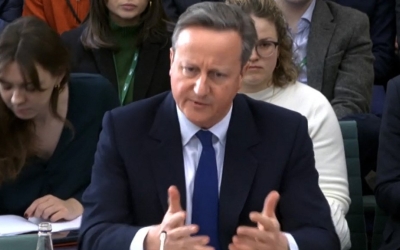War on Gaza: Israel 'most likely' dropped 1,000-pound bomb on UK doctors in Gaza

Israeli forces “most likely” used a 1,000-pound bomb when they hit a compound housing British doctors working for UK and US organisations in southern Gaza earlier this month, a UN investigation has found.
In results released on Tuesday, UN investigators said the early morning strike on 18 January probably involved an MK83 bomb guided by a GBU32, a type of kit that turns “free fall” bombs into precision-guided missiles.
The new revelations will increase scrutiny of US and UK arms sales to Israel as it is possible weapons or components made in both countries were used in the attack, arms control experts and lawyers said.
The State Department and UK Department for Business and Trade both told MEE that they keep arms export licences under continual review, but would not comment specifically on whether the incident had impacted weapons sales or transfers.
The UK’s Medical Aid for Palestine (MAP) and the US-based International Rescue Committee (IRC), headed by former UK foreign secretary David Miliband, have condemned the attack which injured several of their team members and a bodyguard, and severely damaged the residential compound.
New MEE newsletter: Jerusalem Dispatch
Sign up to get the latest insights and analysis on Israel-Palestine, alongside Turkey Unpacked and other MEE newsletters
They are now seeking further answers after the bombing forced the suspension of the life-saving medical work their team was providing to Nasser Hospital, which ran out of food, anaesthetics and painkillers a week ago, and is currently besieged by Israeli forces.
“We need to know the facts as to why this air strike took place and receive assurances of non-recurrence,” the organisations said in a joint statement.
'We need to know the facts as to why this air strike took place and receive assurances of non-recurrence'
- Medical Aid for Palestine, and International Rescue Committee statement
“We further demand that our colleagues in Gaza, their families and all civilians and humanitarian workers in Gaza be protected from further attack.”
The Israeli military gave assurances to the UK on 22 December that the coordinates of the site in the town of Al-Mawasi had been marked as a protected, humanitarian site.
An Israeli military spokesperson asked about the attack told Middle East Eye that it “follows international law and takes feasible precautions to mitigate civilian harm”.
The UK Foreign Office declined to answer whether Israel had provided any explanation about why the de-conflicted site had been bombed.
The department referred MEE to comments in parliament made by Foreign Office minister Andrew Mitchell on Monday in which he said Foreign Secretary David Cameron and British ambassador in Israel, Simon Walters, had raised their concerns in Israel.
Arms sales under scrutiny
The department further declined to say whether or how Israel’s use in the bombing of an F-16 jet, which have been acknowledged after earlier Gaza wars to "almost certainly" contain UK-made components, had impacted the arms export licensing advice it gives to the Department for Business and Trade.
MP Brendan O'Hara, the Scottish National Party's foreign affairs spokesperson, told MEE that under the government's own criteria, weapons may not be exported "where there is a clear risk they might be used in violations of international law".

O'Hara said last week's interim ruling by the International Court of Justice in the Gaza genocide case against Israel should mean "an immediate embargo on arms sales to Israel".
"The Westminster government must stop prioritising trade objectives over the lives of Palestinians and focus on persuading Israel to abide by the International Court of Justice ruling," he said.
MEE sought a comment from Labour shadow foreign secretary David Lammy but did not receive a response by the time of publication.
Foreign Office advice on arms sales to Israel has been under increased scrutiny after legal and human rights groups filed a legal challenge against the government in the High Court in December attempting to stop UK arms sales to Israel for its ongoing campaign.
Earlier this month, a court document filed by the government in the case revealed that Cameron recommended that arm sales to Israel continued despite serious concerns in the Foreign Office that Israel had breached international law in Gaza.
Siobhán Allen, a lawyer with the Global Legal Action Network, one of the groups challenging the government, said the concerns raised in that document “can now only be more acute in the face of an incident of such obvious concern as this”.
“The government can no longer continue its pretence of turning a blind eye to the fact that its own laws require the immediate suspension of arms licences, especially as the International Court of Justice found that there is a plausible case that genocide is occurring in Gaza,” Allen said.
'The government can no longer continue its pretence of turning a blind eye to the fact that its own laws require the immediate suspension of arms licences'
- Siobhan Allen, Global Legal Action Network
A database compiled by the Campaign Against the Arms Trade (CAAT) using publicly available information shows that in the first six months of 2023 alone, four licenses were granted to UK companies worth at least £186,000 to export components for combat aircraft to Israel which CAAT said could potentially include F-16 components.
Emily Apple, CAAT’s media coordinator, said the UK government’s lack of comment on the impact on arms exports “speaks volumes”.
“Under its own regulations, it has to suspend arms exports when there is a clear risk they could be used to commit war crimes,” she said. “It could not be any clearer that this is happening.”
The US has sold MK83s - the bomb likely used in the attack - to Israel and, at least up until December, reportedly rushed transfers of precision-guided munitions, the kit believed to have been used in the attack, citing a little-known Congressional provision.
A State Department spokesperson said arms transfers were evaluated on a case-by-case basis in accordance with the Conventional Arms Transfer Policy, including the risk that the recipient could use the transfer to contribute to the violation of international humanitarian law.
They also said they expected Israel to target only legitimate military targets and to follow the law of war when making decisions about military operations, including taking measures to reduce the risk of harm to civilians and investigating credible allegations of law of war violations when they arise.
The department declined to comment specifically on whether the UN's findings that bombs and munitions kit sold by the US to Israel had been used in the attack would impact future sales or transfers.
Middle East Eye delivers independent and unrivalled coverage and analysis of the Middle East, North Africa and beyond. To learn more about republishing this content and the associated fees, please fill out this form. More about MEE can be found here.




